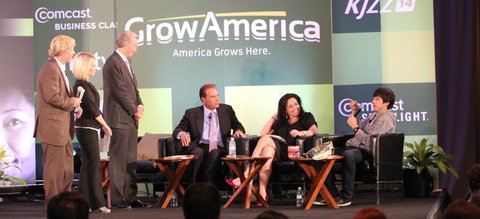It didn’t matter that Mr. Wasserman was considered a nice guy, something for which his grandfather, the super-scary agent and studio boss Lew Wasserman, was not especially known. When boys grow up in Hollywood as Casey did — rich, surrounded by celebrities, with V.I.P. concert tickets a phone call away — they often emerge as world-class jerks. Casey somehow came out a mensch.
Yes, that’s nice. But could Mr. Wasserman ever follow in his grandfather’s footsteps as a force in business, civic affairs and politics?
It is no longer a question.
Mr. Wasserman, 39, is chief executive of the Wasserman Media Group, a sports-focused management and marketing firm. Founded 11 years ago, this $150 million business is now one of the largest sports agencies in the world, negotiating lucrative television and endorsement deals and handling naming rights for billion-dollar complexes, including MetLife Stadium in New Jersey. Nike, Pepsi and Microsoft are corporate clients, and individual clients include Derrick Rose of the Chicago Bulls and Andrew Luck of the Indianapolis Colts.
Astoundingly, Wasserman Media represented the No. 1 overall draft pick last year in five professional sports: men’s and women’s basketball, baseball, soccer and football. “There’s a sense of permanence about Casey,” said Adam Silver, the incoming commissioner of the N.B.A. “You know you are going to be dealing with him for a very long time.”
Mr. Wasserman has also become a big deal behind the scenes in his hometown. That new $116 million medical building at the University of California, Los Angeles? He had it built, with his foundation providing significant financing. A $300 million movie museum will soon rise on Wilshire Boulevard, a partnership of the Oscars organization and the Los Angeles County Museum of Art, where he serves on the board. The alliance was his idea.
“I only see him growing in stature, and he’s already one of the most civically active philanthropists in the city,” said Antonio R. Villaraigosa, the former mayor of Los Angeles, citing the tens of millions of dollars that Mr. Wasserman and his foundation have funneled to the city’s beleaguered public school system. Mr. Wasserman also sits at the center of continued efforts to build a stadium that would bring the National Football League back to the Los Angeles after an 18-year absence. “His influence extends far beyond what you see on the surface,” Roger Goodell, the N.F.L. commissioner, said.
As for political influence, well, put it this way: Hillary Rodham Clinton likely did not have a two-hour breakfast with Mr. Wasserman a few weeks ago just to shoot the breeze. Mr. Wasserman is a trustee of the Bill, Hillary Chelsea Clinton Foundation. He is also a significant Democratic donor and fund-raiser.
IT’S a big and wide-ranging portfolio, but perhaps not a surprising one given the head start he received at birth. Mention Mr. Wasserman’s success around Los Angeles, and some eyes will roll, conveying the sentiment: “What did you expect?”
Mr. Wasserman, whom GQ once called “a kosher Kennedy,” without question had a privileged upbringing. At 10, he helped carry the torch at the Summer Olympics in Los Angeles. At 12, he flew to Ohio to be a Cleveland Browns ball boy. At 18, when he wanted to go to a sold-out Guns N’ Roses concert, his grandfather told him to call David Geffen, one of Hollywood’s biggest power brokers. (“Slash was sweating on my head,” Mr. Wasserman said, recalling how close to the stage his seats were.) At 19, he worked as a production assistant on the hit television series “Murder, She Wrote,” which was taped at Universal, where his grandfather was chairman.
He inherited many important relationships from his grandfather, who died in 2002, including the one with the Clintons. “Casey has a keen intellect and a strong desire to make a difference in both business and society,” Bill Clinton said in an e-mail.
But ne’er-do-well heirs crash and burn all the time proving that access to money and power does not preordain success. Yes, Lew Wasserman lavished attention on his daughter’s son. Every Saturday or Sunday morning for 25 years, he took Casey to Nate n’ Al, a Beverly Hills delicatessen, for matzo brei and a life lesson. But the student had to be willing to learn, and to maintain and expand the relationships he inherited.
“Growing up with means gives a person one important thing, which is the ability to make choices,” Mr. Wasserman said last month as he lounged in his Gulfstream V en route to Los Angeles from Philadelphia. He took a sip of vegan black bean soup and glanced at a TV tuned to the N.B.A. finals.
“Good choices or bad,” he said, clearing his throat, “those are all on me.”
SPORTS was a very specific choice for Mr. Wasserman. He said Hollywood felt too incestuous — a place where, he says, he knew he could never “make a reputation” that was his own. Though not an athlete himself, aside from tennis in high school, he found himself fascinated by the business side of sports from an early age.
“I wasn’t the kid who cried if my team lost,” he said. “I was the kid who wanted to know what was going on in the front office after the game.”
His first business was a success. Mr. Wasserman and a childhood friend, the fashion designer James Perse, started a T-shirt and hat company while attending U.C.L.A., from which Mr. Wasserman graduated in 1996 with a political science degree.

Article source: http://www.nytimes.com/2013/07/07/business/a-sports-agent-with-hollywood-in-his-blood.html?partner=rss&emc=rss


